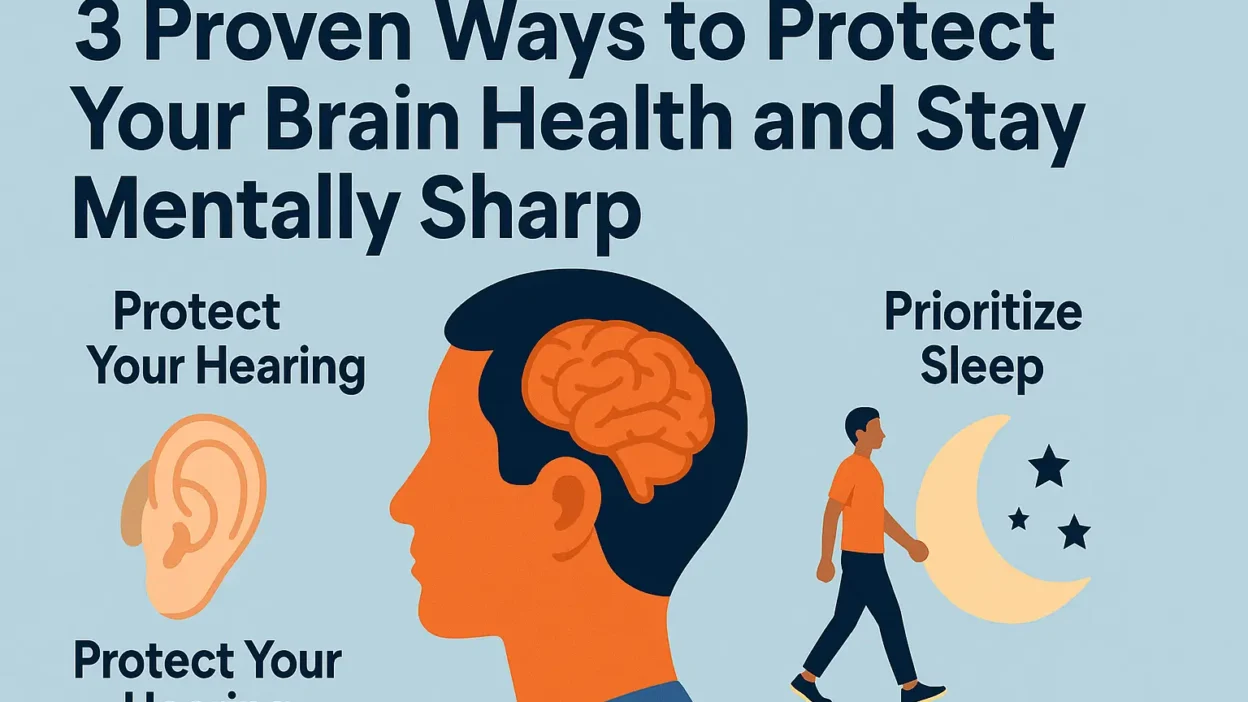Your brain is your most valuable asset, and keeping it healthy is key to staying sharp as you age. With Alzheimer’s and dementia risks rising over time, adopting science-backed habits now can make a big difference. For Alzheimer’s and Brain Awareness Month—and every month—here are three practical, research-supported strategies to boost your brain health, plus one overhyped trend to skip. Let’s dive in!
1. Protect Your Hearing to Safeguard Your Mind
Why it matters: Did you know untreated hearing loss can increase your dementia risk by up to 37%? The longer it goes unaddressed, the higher the risk. Your brain relies on constant communication between nerve cells to stay healthy, and hearing loss disrupts this process, limiting the stimulation your brain needs to thrive.
What science says: Research shows a clear link between hearing loss and cognitive decline. For every 10-decibel drop in hearing (like going from a normal conversation to a faint whisper), dementia risk rises by 16%. Long-term hearing loss—especially over 25 years—amps up the danger even more. But there’s good news: using hearing aids can significantly lower this risk.
What to do: If you’re struggling to hear conversations or notice you’re turning up the TV volume, get your hearing tested pronto. Don’t delay—early intervention with hearing aids can protect your brain and keep it active. Musicians and sound enthusiasts often show increased brain volume from engaging with complex sounds, so don’t miss out on this brain-boosting opportunity!
2. Stay Active to Keep Your Brain Agile
Why it matters: Regular physical activity isn’t just great for your body—it’s a powerhouse for your brain. Exercise increases blood flow to the brain, promotes the growth of new nerve cells, and strengthens connections that keep your mind sharp.
What science says: Studies consistently show that aerobic exercise, like walking, swimming, or cycling, can reduce the risk of cognitive decline by up to 38%. Even moderate activity, like a daily 30-minute walk, can improve memory and focus. Exercise also helps manage stress and inflammation, both of which can harm brain health over time.
What to do: Aim for at least 150 minutes of moderate exercise each week. Mix it up with activities you enjoy—whether it’s dancing, hiking, or yoga—to keep things fun and sustainable. Bonus: exercising outdoors can add a mood-lifting dose of nature to your routine!
3. Prioritize Sleep for Cognitive Longevity
Why it matters: Quality sleep is like a nightly reset for your brain, clearing out toxins and consolidating memories. Poor sleep habits, on the other hand, are linked to a higher risk of Alzheimer’s and cognitive decline.
What science says: Research suggests that getting 7–9 hours of quality sleep per night can reduce dementia risk by supporting the brain’s ability to clear harmful proteins, like amyloid, which are linked to Alzheimer’s. Chronic sleep deprivation, even in your 40s and 50s, can increase your risk of cognitive issues later in life.
What to do: Create a sleep-friendly routine by sticking to a consistent bedtime, limiting screen time before bed, and creating a calm, dark sleep environment. If you suspect sleep issues like insomnia or sleep apnea, talk to your doctor—addressing these can be a game-changer for your brain health.
Skip This: Nootropic Supplements
The hype: Nootropics, often called “smart drugs” or “brain boosters,” promise sharper focus and better memory. With a global market hitting nearly $9 billion in 2022, these over-the-counter supplements are a hot trend, especially in the U.S.
The reality: The science behind most nootropics is shaky at best. A review of 18 common ingredients—like omega-3s, L-theanine, and vitamin B12—found no solid evidence that they improve memory or cognitive function. Worse, many supplements don’t even contain what’s listed on the label, and some include unlisted ingredients that could pose health risks. Unlike prescription nootropics for conditions like ADHD or Alzheimer’s, over-the-counter versions often rely on vague claims that dodge FDA scrutiny.
What to do: Save your money and protect your health. Before trying any supplement, check with your doctor to avoid wasting cash on unproven products—or risking harmful side effects.
Take Charge of Your Brain Health Today
By focusing on proven strategies like protecting your hearing, staying active, and prioritizing sleep, you can lower your risk of Alzheimer’s and dementia while keeping your mind sharp. Skip the unproven nootropic hype and invest in habits that science supports. Your brain will thank you for years to come!
Ready to start? Get your hearing checked, lace up your sneakers, and aim for a good night’s sleep tonight. Small steps today can lead to big wins for your brain tomorrow.





